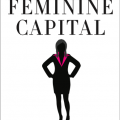The WhatsYourTech.ca Women Entrepreneurs series explores entrepreneurial experiences that women in Canada have taken as small business owners. They share startup, management and glass ceiling moments as only women can experience. What’s more, the entrepreneurial women that I have met researching this series as well as throughout my career have also shared how their businesses have been supported and inspired by like-minded women in their lives – mentors, grandmothers, mothers and colleagues. Their journeys are as women as well as businesswomen.
Shining a spotlight on the power of women entrepreneurship and how gender can influence entrepreneurial decision-making are co-authors of Feminine Capital, Barbara Orser and Catherine Elliott. Within their book, Orser and Elliott draw on four decades of research to posit how women are leveraging their skills and sensibilities as women to change our social and economic landscape, one business venture at a time. They answer questions:
• What is feminine capital?
• How is feminine capital transforming entrepreneurship?
• How can entrepreneurship inform feminism?

Co-authors
Barbara Orser and Catherine Elliott
I recently had the opportunity to discuss women entrepreneurship in context to Feminine Capital with Ms. Orser, author and award-winning full-time professor at the University of Ottawa Telfer School of Management.
Q. The name of your book is ‘Feminine Capital’. What does feminine capital mean?
A. “Feminine Capital offers new insights about the emerging power of women entrepreneurs and how and why they are infusing feminist values in business practice.”
“A common ambition of many women is the desire to empower others. Entrepreneurship is seen as a mechanism to create economic self-sufficiency and equity-based outcomes. In an upbeat way, the book explains entrepreneurial feminism and why women are infusing feminist values in their business practices. Stories and scenarios illustrate key concepts.”
Q. What motivated you to write Feminine Capital?
A. “I was irritated by (often male but also female) colleagues (academics, policymakers, bankers, others) who would pronounce that there are no gender issues in entrepreneurship.
Too often, they would base their views on personal experiences, rather than on what the research says.”
“Our first encounter with feminist entrepreneurs came from an unexpected source—the women of Wolfville, Nova Scotia, a small town in Atlantic Canada. It was among these business owners that we recognized the power of feminine capital. Conducting interviews was not initially part of a holiday, but we were introduced to the founder of a community-based theatre troupe. Then we were introduced to six more local entrepreneurs. All had founded business or social enterprises. All spoke about the need for social change. They all told us about their efforts to earn a living while improving the lives of others. These women were calling on their knowledge as caregivers, community champions, artisans, and former employees to develop new products, new markets, new services, and better processes. Some were creating “by women, for women” enterprises. They saw themselves as feminists, women of Wolfville, and women of the world. Their commitment to equity through enterprise was inspiring.”
“Arriving back in Ottawa, we decided that we would seek out more women who share such entrepreneurial perspectives. Surprisingly, it was not difficult. Reaching out to our North American contacts in small-business training agencies, many business owners contacted us to tell their stories. Diamond extractors in Northern Canada, mid-western manufacturers, and west coast retailers described the ripple effects of their enterprises.”
“Motivated by their insights, in this book we draw on the lessons we learned from the many business owners who sought to talk to us, as well as from other findings of our ongoing research program. Collectively, our studies document the experiences of over twenty thousand entrepreneurs.”
“One lesson [we learned] is that for many women, venture creation is not gender neutral. Yet, recognizing feminine capital in the venture creation process is not obvious. Its impacts are subtle. Its magnitude is obscure. At the surface lie visible markers of gender. But gender effects are realized in many ways: in entrepreneurial decisions and assumptions, within identity and perception, and through actions and interaction. Gender is linked to the firm by way of governance and corporate culture, and is reproduced through institutional relationships within financial intermediaries, government, and academe. In other words, gender is embedded within the venture creation and exchange process.”
Q. Describe who you wanted your book to reach?
A. “[We wrote Feminine Capital for the] entrepreneurship ecosystem, including women entrepreneurs, women business owners and self-employed workers plus intermediaries who support women, including small business training practitioners, policymakers, incubation and tech transfer personnel, and academics at post-secondary institutions.”
Q. Tell me about your research involving 20,000 entrepreneurs.
A. “[We drew on] four decades of research, to reveal how women are harnessing different approaches to doing business. We employed collaborative, large-scale (representative surveys) of small business owners, regional fieldwork, telephone interviews, and intimate personal conversations with hundreds of women entrepreneurs. This was to ensure that we captured the patterns of women’s enterprise and, more importantly, the lived experiences of entrepreneurial women.”
“Methodologies included advanced statistics (e.g., multivariate analysis using large samples, n=12,000) to smaller surveys (n=15) using computer software for qualitative data analysis (N’VIVO).”
Q. How did you start your research?
A. “I have been researching and championing issues associated with women’s enterprise for over 25 years. When I started the fieldwork, my first large-scale study was about home-based businesses – still the largest study to date in Canada on the topic, there were very few studies about women’s enterprise. Today, it is exciting to see how the literature has matured, including the number of interested researchers.”
Q. What are your most interesting findings from your research?
“Personally, I am most excited about two topics. First, we coin and explain the concept of ‘entrepreneurial feminism’. [Our] work challenges the too often negative, feminist discourse about commerce, and profiles the positive power of entrepreneurship for women, including how many are acting as change agents to support the well being of girls and women.”
“Second, throughout our extensive fieldwork, we recognized ‘the pillars of feminine capital’, [our] second highly original concept, and offer new insight into the ways that gender can influence entrepreneurial decision-making. We found that leveraging feminine capital can help women to create distinctive brands, build new markets, and drive profits—all while leveling the playing field in business. In doing so, women are changing our social and economic landscape, one venture at a time.”
Q. What are some of the recurring myths and misperceptions about WE?
A. “Two come to mind. First, women business owners are not growth-oriented. Not true – they are building businesses, many with social enterprise agendas – in their own ways!”
“Second, we describe a number of myths about SME financing, including that Canadian commercial lenders discriminate against female applicants. The far more significant issues is what we call ‘discouraged borrowers’, women who need capital and would otherwise be funded, but do not do so because of fear of being turned down. This assertion is based on multiple studies in Canada (and indeed, the US) using large, ‘representative’ samples of CDN (US) business owners (Statistics Canada data, etc.). Many business owners and advocates do not like to hear such results. I suspect that the misperception is a product of historical media coverage.”
“That said, we know little about informal turndowns and equity investment capital – areas that need further inquiry.”
Q. What is your advice for women entrepreneurs in Canada?
A. “Be informed! Check your assumptions! Read the book!”
“Learn about how gender can influence your business practices – often without one being aware of how being female plays into entrepreneurial decision-making. For many, feminine capital is a strength; for some a professional liability. This includes managing growth, ideation, social capital, financing – and all other aspects of venture creation.”
Q. Have you been an entrepreneur? In what business?
A. “Yes. For over 20 years, I have owned Canada Works Inc., a small consulting operation that conducts economic research.”
Q. What was your experience starting and running a business?
A. “I do not focus on this aspect of my work in the book, but readers may appreciate that I too manage the challenges of a micro-enterprise.”
Professor Orser is Vice-Dean (Career Development), and the Deloitte Professor in the Management of Growth Enterprises. In 2010, Dr. Orser was recognized by the Women’s Executive Network as a 100 Most Power Women in Canada (Champion Category) and The International Alliance of Women World of Difference 100 Awards. In 2011, she received the University of Ottawa Telfer School of Management Award for Service, Teaching and Research.
She is an active advisor to the federal government and the former Chair of the Taskforce for Women’s Enterprise Growth (2009-2011), a Canadian non-partisan consortium of prominent women business owners, SME service agencies, academics and industry associations.
 Feminine Capital is available at Amazon.ca as well as Chapters Indigo.
Feminine Capital is available at Amazon.ca as well as Chapters Indigo.
Interested in Entrepreneurism?
Entrepreneurism: Vision, Skill and a lot of Tenacity
Where Does the Money Come From? Funding options for Entrepreneurs



